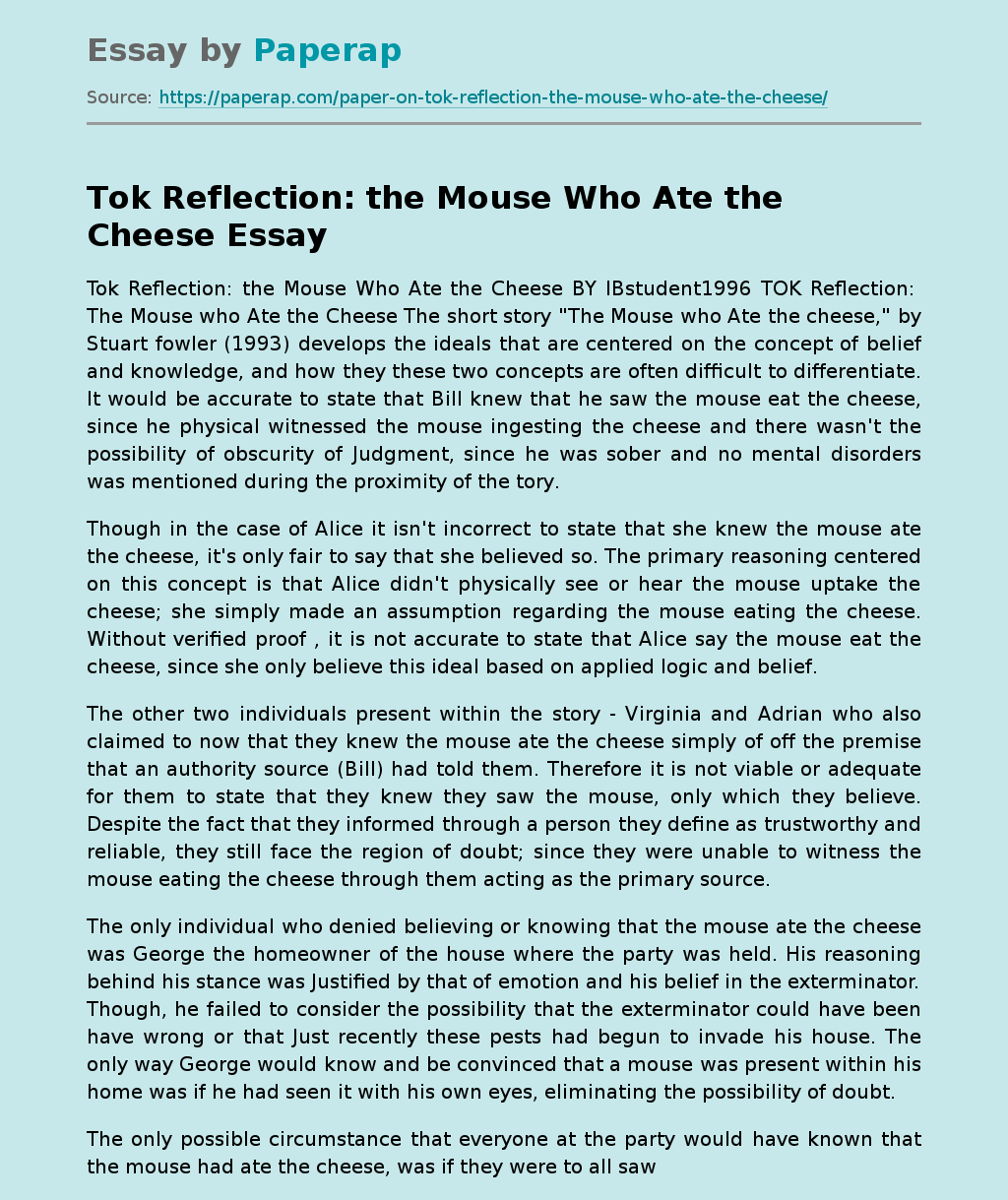Tok Reflection: the Mouse Who Ate the Cheese
Tok Reflection: the Mouse Who Ate the Cheese BY IBstudent1996 TOK Reflection: The Mouse who Ate the Cheese The short story “The Mouse who Ate the cheese,” by Stuart fowler (1993) develops the ideals that are centered on the concept of belief and knowledge, and how they these two concepts are often difficult to differentiate. It would be accurate to state that Bill knew that he saw the mouse eat the cheese, since he physical witnessed the mouse ingesting the cheese and there wasn’t the possibility of obscurity of Judgment, since he was sober and no mental disorders was mentioned during the proximity of the tory.
Though in the case of Alice it isn’t incorrect to state that she knew the mouse ate the cheese, it’s only fair to say that she believed so. The primary reasoning centered on this concept is that Alice didn’t physically see or hear the mouse uptake the cheese; she simply made an assumption regarding the mouse eating the cheese.
Without verified proof , it is not accurate to state that Alice say the mouse eat the cheese, since she only believe this ideal based on applied logic and belief.
The other two individuals present within the story – Virginia and Adrian who also claimed to now that they knew the mouse ate the cheese simply of off the premise that an authority source (Bill) had told them. Therefore it is not viable or adequate for them to state that they knew they saw the mouse, only which they believe.
Despite the fact that they informed through a person they define as trustworthy and reliable, they still face the region of doubt; since they were unable to witness the mouse eating the cheese through them acting as the primary source.
The only individual who denied believing or knowing that the mouse ate the cheese was George the homeowner of the house where the party was held. His reasoning behind his stance was Justified by that of emotion and his belief in the exterminator. Though, he failed to consider the possibility that the exterminator could have been have wrong or that Just recently these pests had begun to invade his house. The only way George would know and be convinced that a mouse was present within his home was if he had seen it with his own eyes, eliminating the possibility of doubt.
The only possible circumstance that everyone at the party would have known that the mouse had ate the cheese, was if they were to all saw it with their own eyes, in a sober state, Personally, I believe that here is a definable difference between an individual knowing something and believe something. In order for a person to know I believe that they must witness it first hand, without the possibility of anything that could disorient their mental state.
Though there are situations where this necessary can’t always be achieved, I believe that there must be more than one source stating the same thing. To simply belief something has always been a difficult concept for me to relate to, since to believe individuals must confront the possibility that their “belief” has the possibility to be wrong. Along with this, many times the concept that is to be believed doesn’t hold the complete truth due to the possibility of perception and biases.
Often I think that individuals misconceive the ideals of belief with knowledge, defining their own belief as factual, without considering the prospect that their inaccurate and untrue. nougn, tnls also poses tne Tact on wnetner or not a person’s Deller true or not can De defined as knowledge. Finally, the ideals that are centered on belief and knowledge are often difficult to differentiate, it is often heavily relating on a person own personal perception and perspective on the questioned topic.
Tok Reflection: the Mouse Who Ate the Cheese. (2018, Jul 26). Retrieved from https://paperap.com/paper-on-tok-reflection-the-mouse-who-ate-the-cheese/

